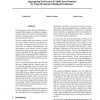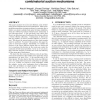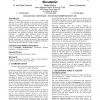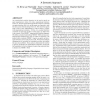ATAL
2010
Springer
15 years 2 months ago
2010
Springer
65
Voted
ATAL
2010
Springer
15 years 2 months ago
2010
Springer
cting knowledge base can be seen abstractly as a set of arguments and a binary relation characterising conflict among them. There may be multiple plausible ways to evaluate confli...
115
Voted
ATAL
2010
Springer
15 years 2 months ago
2010
Springer
Memory-bounded techniques have shown great promise in solving complex multi-agent planning problems modeled as DEC-POMDPs. Much of the performance gains can be attributed to pruni...
99
Voted
ATAL
2010
Springer
15 years 2 months ago
2010
Springer
The primary target of this work is human-robot collaboration, especially for service robots in complicated application scenarios. Three assumptions and four requirements are ident...
140
Voted
ATAL
2010
Springer
15 years 2 months ago
2010
Springer
Establishing trust amongst agents is of central importance to the development of well-functioning multi-agent systems. For example, the anonymity of transactions on the Internet c...
93
Voted
ATAL
2010
Springer
15 years 2 months ago
2010
Springer
In this paper, we study a maximum likelihood estimation (MLE) approach to preference aggregation and voting when the set of alternatives has a multi-issue structure, and the voter...
81
Voted
ATAL
2010
Springer
15 years 2 months ago
2010
Springer
This paper analyzes the worst-case efficiency ratio of falsename-proof combinatorial auction mechanisms. False-nameproofness generalizes strategy-proofness by assuming that a bidd...
98
Voted
ATAL
2010
Springer
15 years 2 months ago
2010
Springer
Agents in a multi-agent system do not act in a vacuum. The outcome of their efforts depends on the environment in which they seek to act, and in particular on the efforts of other...
38
Voted
ATAL
2010
Springer
15 years 2 months ago
2010
Springer
97
Voted
ATAL
2010
Springer
15 years 2 months ago
2010
Springer
An organizational modeling language can be used to specify an agent organization in terms of its roles, organizational structure, norms, etc. Such an organizational specification ...




